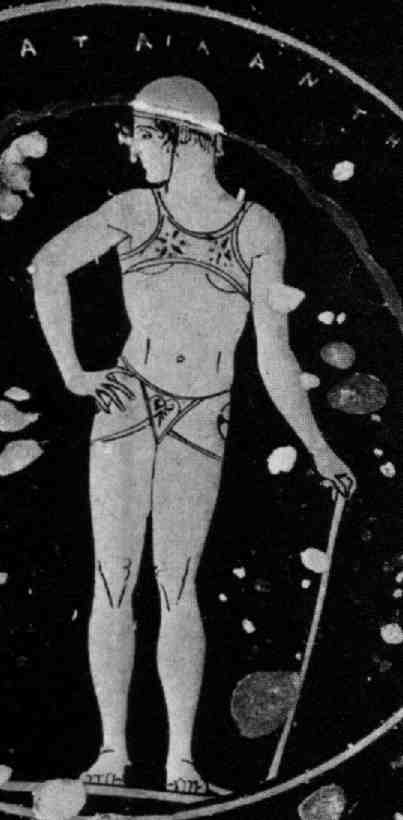Atalanta
A girl with attitude
She had features which in a boy would have been called girlish, but in a girl they were like a boy's.
Ovid, Metamorphoses VIII, 322-3
Not to be confused with Atlanta, the place where the 1996 Olympic Games were held - although Atalanta would have won all the track medals, men's and women's! She could run faster than any man - and was advised by the god Apollo that she'd be wise to avoid marriage! Not wishing to seem weird, though, she said she'd be quite happy to marry any man, provided he could beat her on the track.
 She was, of course, stunningly beautiful - especially when stripped
to her underwear for running; but a sort of beauty that particularly
appealed to the Greek male. When Hippomenes saw her for the first time,
he fell in love, thinking that she had just the kind of figure which he
(or Adonis, the paragon of Greek male beauty) would have had himself if
he were a woman - wow! He found himself praying that no one else would win
her before he had his chance. No problem there - she totally blew away all
her current suitors - and by the way, they knew the penalty if they lost
- instant death from the javelin she always carried!
She was, of course, stunningly beautiful - especially when stripped
to her underwear for running; but a sort of beauty that particularly
appealed to the Greek male. When Hippomenes saw her for the first time,
he fell in love, thinking that she had just the kind of figure which he
(or Adonis, the paragon of Greek male beauty) would have had himself if
he were a woman - wow! He found himself praying that no one else would win
her before he had his chance. No problem there - she totally blew away all
her current suitors - and by the way, they knew the penalty if they lost
- instant death from the javelin she always carried!
But Hipppomenes was so smitten that he decided to challenge her - she was impressed by his courage and his amazing beauty, just like hers would have been, she thought, if only she were a boy! Despite herself, she was falling in love with him. Fortunately, Hippomenes had a secret weapon. The goddess Venus, to whom he was praying for victory, slipped him three golden apples from her sacred tree in Cyprus. As the race got underway, and Atalanta had already sprinted past him, he rolled one of the apples in front of her, and Atalanta, being a real girly underneath, stopped to pick it up, letting Hippomenes surge ahead - the same thing happened twice more, with Venus making the third apple extra heavy to slow her down!
And so she lost, and the two athletes got duly married. But was Hippomenes grateful for the help he got from Venus? No, he didn't even bother to say thankyou for all her help, carried away by his passion for his new bride. And so Venus decided they would not live happily ever after. Soon she got her opportunity to punish them. The lovers were in the woods, and went into a holy cave, full of ancient statues of the gods, to rest. There Venus roused Hippomenes' manhood, and he was seized by an uncontrollable urge to make love to Atalanta in this forbidden place. As they entwined like frantic animals, they began to sprout fur, their hands grew claws, and they could only roar and grunt instead of speaking. They were lions, destined to roam the forest...
 But Hippomenes was not Atalanta's first conquest. Her father had apparently
wanted a boy, and so, in good Greek tradition, threw her out in the mountains
to be killed by wild animals (like Oedipus). But
a bear found her, and suckled her like one of its cubs, and she was eventually
rescued by shepherds - but (perhaps because of her father's treatment) vowed
to remain a virgin - and killed two Centaurs who tried to make her change
her mind.
But Hippomenes was not Atalanta's first conquest. Her father had apparently
wanted a boy, and so, in good Greek tradition, threw her out in the mountains
to be killed by wild animals (like Oedipus). But
a bear found her, and suckled her like one of its cubs, and she was eventually
rescued by shepherds - but (perhaps because of her father's treatment) vowed
to remain a virgin - and killed two Centaurs who tried to make her change
her mind.
She got a reputation as a huntress, and was consequently invited to join the heroes (Jason, Theseus, Castor and Pollux and many others) to hunt down the giant boar that was terrorising the town of Calydon in northwest Greece. As soon as he saw her, the local hero, Meleager, was overcome with love - but too modest to do anything about it! During the hunt Atalanta was the first to wound the boar which had already made fools of many strong men - and Meleager's admiration grew. He was the one who eventually killed the beast, but he insisted on giving Atalanta the head, hide and tusks. This enraged Meleager's uncles, who stepped in and stopped the presentation - what a disgrace for a woman to interfere in men's sport!
Meleager was furious and killed them both, thus causing a terrible dilemma for his mother, Althaea. Should she avenge her brothers and kill her son? (She could easily do this, as she had a log which was fated to last as long as her son's life - all she had to do was chuck it on the fire.) After agonising she "saved herself from guilt by a guilty deed" - and Meleager was incinerated as the log blazed up on the fire ...

